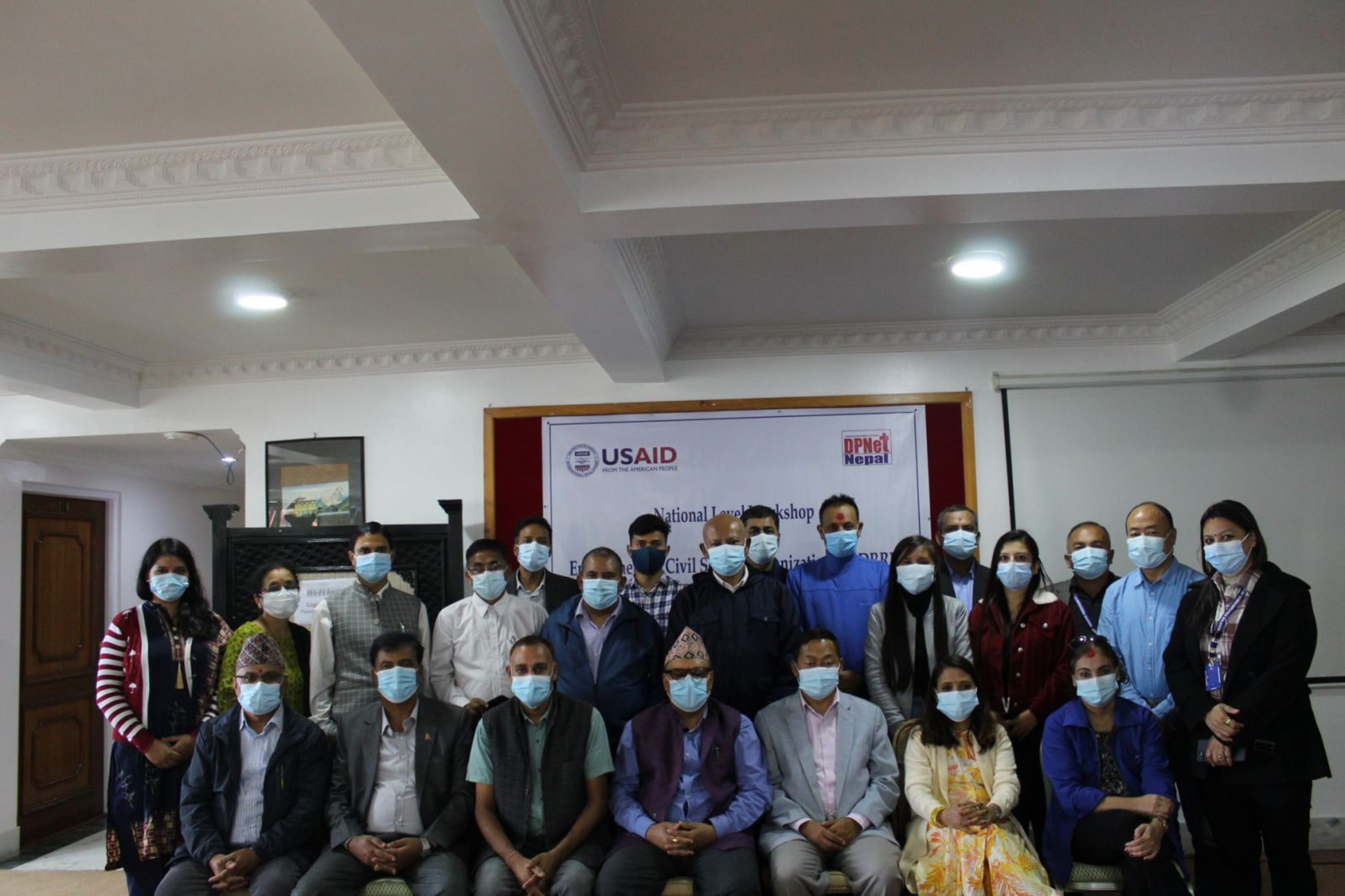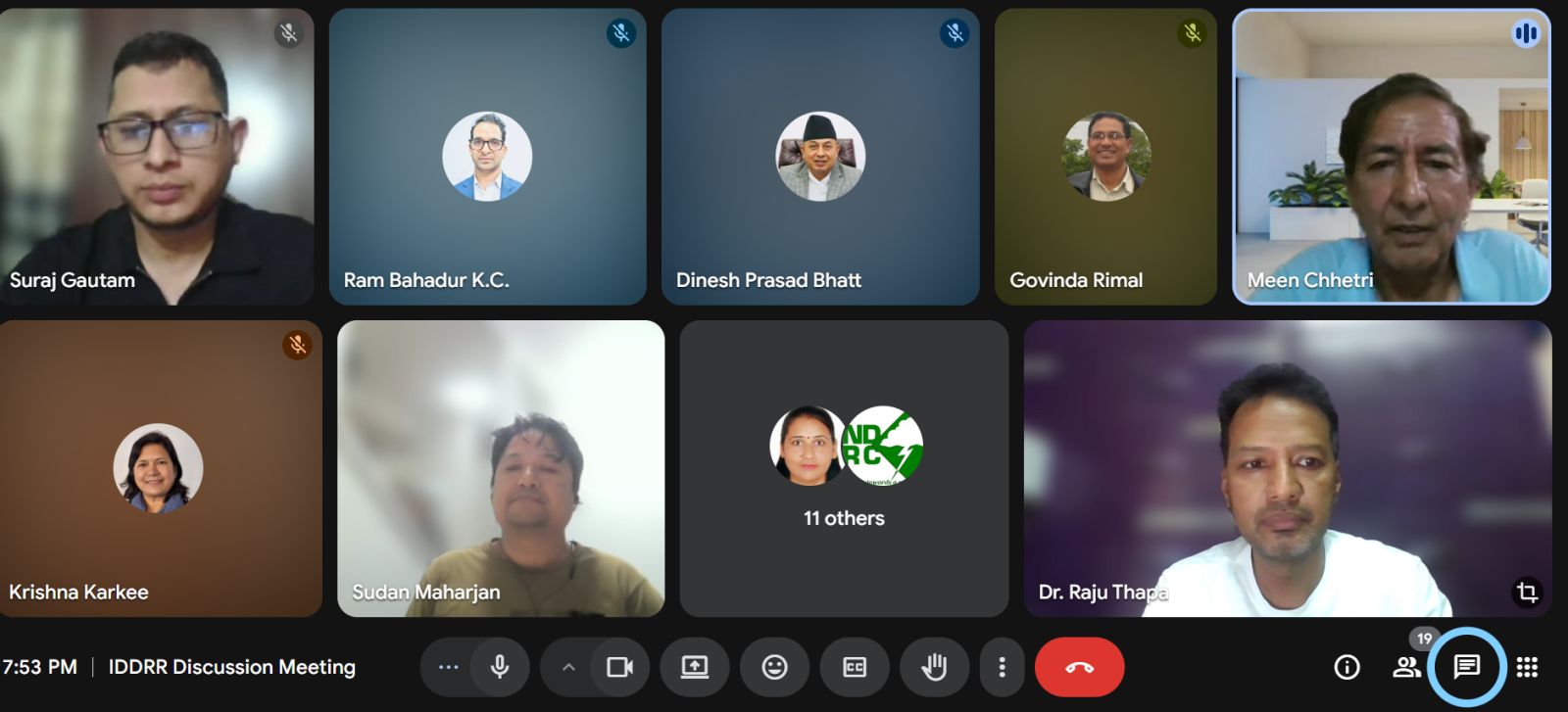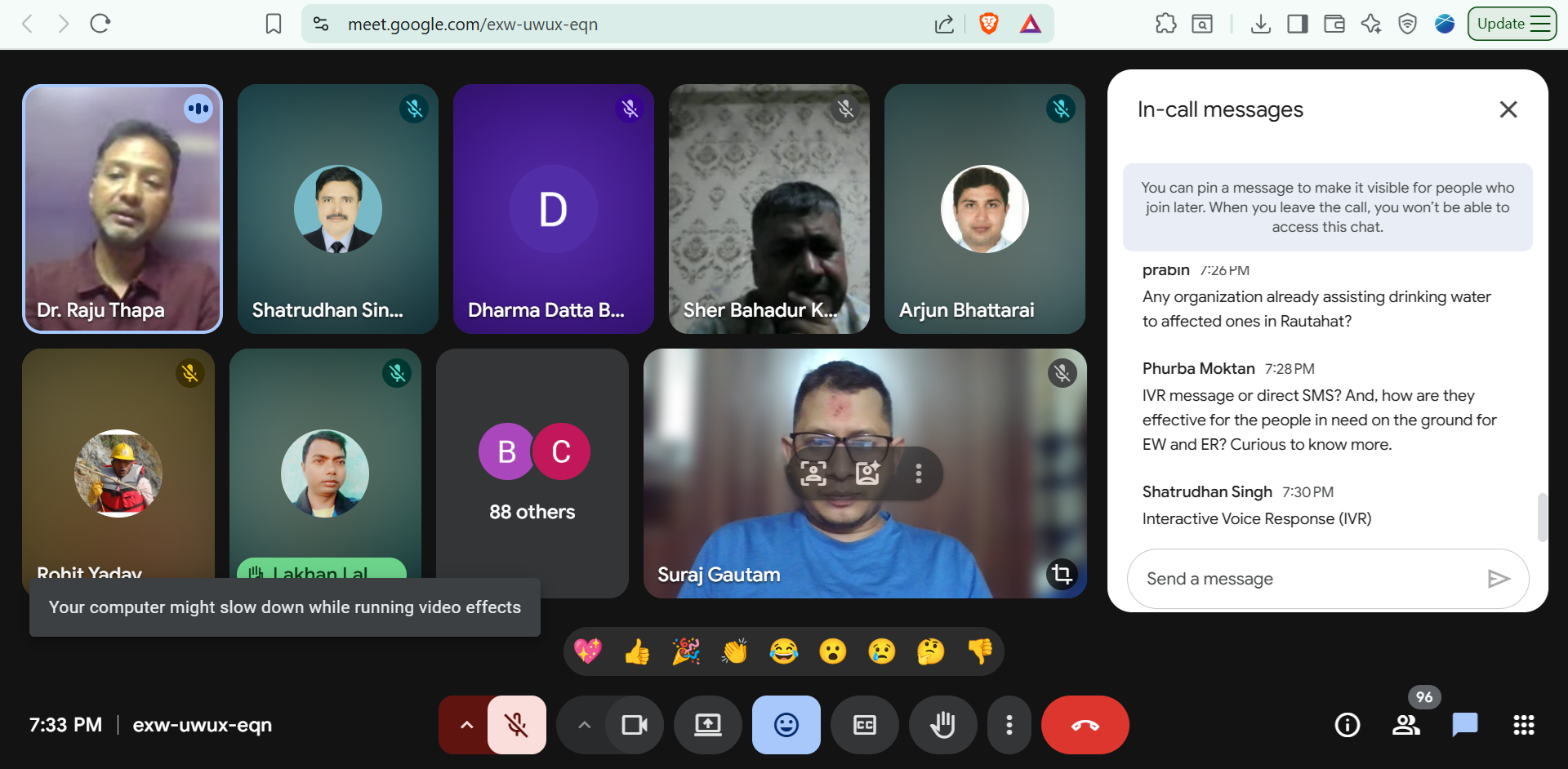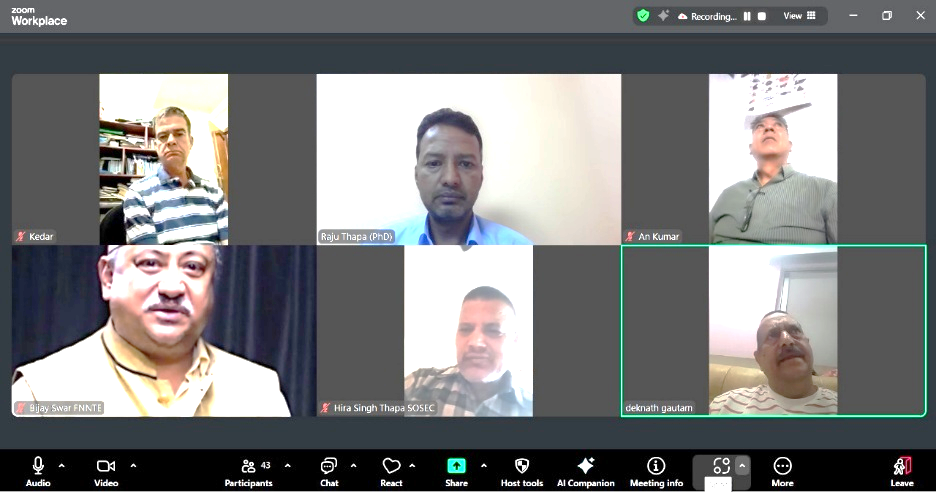National Level Workshop on Engagement of civil society organization in DRR&M

The National Level Workshop on Engagement of Civil Society Organization in DRRM was organized in Hotel View Bhirkuti, Godawari, Lalitpur on 20-21, Oct, 2021. The opening session of the program was chaired by DPNet Chair Mr. Surya Bahadur Thapa. The Program Coordinator of DPNet, Ms. Luna Khadka, introduced the agenda of the program. Dr. Raju Thapa, General Secretary of DPNet highlighted the objectives of the program and welcomed the participants. He anticipated something innovative from the workshop to engage CSOs in the DRRM sector in a more effective, efficient and coordinated way.
In the closing remarks of the opening session, Mr. Surya Bahadur Thapa emphasized on generating ideas to engage CSOs in DRRM sectors to mainstream DRRM in every sphere of their activities. Altogether, 23 participants participated in the workshop.
Major Highlights
1st Day
Introduction: First of all, all the participants introduced themselves, the participants were from NGO, INGO, media, government and Civil Society Organization (CSO).
Mr. Ram K Gurung, Consultant of the National level workshop CSO in DRR&M, gave presentation on “CSO’s engagement in the DRM process: Role and essentials” where he differentiate about the terminology NGO (Non-Government Organization) and CSO (Civil Society Organization). He explained how CSOs are instrumental in implementing DRRM activities and engaged in the process with some hands-on illustration in the Nepalese and foreign context. He was familiarized with the guidelines by NDRRMA on CSO mobilization and their roles in DRRM in various sectors. He further added about CSOs to hold the consultation on gaps and challenges encountered when implementing the Sendai Framework at the local level. They also support local communities to strengthen their coping against disaster impacts through practical and needs driven approaches. Civil society organizations are to ensure that they become active members of respective national DRR Platform to advocate and support the development or updating of risk informed national and local DRR strategies. He further shared the roles of CSO, SPHERE and humanitarian principles, CHS humanitarian principles. At the end of the day, I shared about the legal provision on DRRM in Nepal.
Discussion:
· It was discussed about the further roles of CSO in disaster management
· It was discussed about the building capacity across the board array of CSOs should be seen as a long term process- perhaps drawing on learning from the experience of DRR
· It was about the building capacity to engage in order to enhance quality, and that capacity building
· Invest time and resources to build capacity in DRR, including participating in training and collaboration with governments and multilaterals, conducting policy analysis and research and advocating for local voices being included in the process- all building towards a more evidence based DRF approach that delivers for people living under the influence of disaster.
· Women and people with disabilities are highly vulnerable to disaster so DRR&M should be implemented from GESI perspectives.
· It was discussed about capacity, legal and operational environment of CSO to operate disaster management.
· The participants should not be done forcefully as it may affect the lifestyle of people and there will be no learning as well.
· There is a lot of process to be followed during and after disaster which practically becomes too late to help in need.
· There should be effective implementation as there are many resources available.
· Political influence should be positively influenced rather than manipulated during disaster management.
· These types of workshop and training, other policies, acts and strategies should be in action rather than only in written form.
2nd day
On Oct 21st oct, 2021, the program started with the recap of the previous day by Mr. Ram K Gurung. He shared the visual presentation and Meta card presentation on sphere commitments. He further presented Sphere core humanitarian standard. He shared the concept of Sphere, its background, philosophy, 9 commitments, structure and components, charter, protection/core principles and shared the web link for more information about the sphere. In Core Humanitarian Standard, he shared about structure of CHS, commitments, quality and accountability and participation typology. He explained the protection principles and its needs, structure, the protection principles and the humanitarian charter, protection specialists and key messages. He gave brief about the practical and strategic aspects of GESI and how to address it with emergency protection
How the GESI has been provisioned in those legal documents and what is the implementation status of the GESI provisions. He highlighted the concept of CSO to make their presence in the process of their engagement in DRRM. He gave examples and case studies of engagement of CSOs in the process of DRRM from abroad and Nepal on various scenarios. He further explained about GESI and protection principle in emergencies and normal phase. And finally, shared about the existing good practices and gaps and issues they see as a hindrance to their participation in the DRRM process and feedback along with the suggestions.
Discussion
· It was discussed about the importance of youth mobilization and youth taking lead in DRR&M.
· It was discussed about the disaster issue addressed by other sectors such as health sector, water resources as the disaster is directly and indirectly linked with all sectors.
· There are many active and inactive organizations related to DRR&M. The inactive organizations usually make a slight negative impression and create doubt on the working module.
· The organizations working on these sectors should not be money minded, but should be active in working mechanisms. Issues of each and every consumer should be addressed.
· CSOs should be strong in the advocacy part. There are many local and community resources, these should be used, mobilized or preserved as according to need.
· It was about gender balance. As no male and no female should be discriminated against in each and every sector. Equality and equity should be cleared and addressed. There should not be forced participation for anyone as it won’t be as effective as interested candidates.
· There should be a strong gender balance. In case of GESI policies many gender issues related to female are highlighted as male discrimination also should be addressed. This creates a strong gender balance.
· The inter gender discrimination also should be stopped.
· It was discussed about the strong participation of females in decision making processes as well.
The group discussion was carried out as there were 3 groups formed for the discussion on the topic: Policy, Capacity, Coordination and Networking, GESI and Security.
Group Work- Discussion
· The relief materials in disaster are not easily available, these should be faster and easily available.
· There should not be social, political and gender discrimination while rescuing from disaster.
· The settlement of the community in a safe area is necessary. The settlement in vulnerable areas should be strictly prohibited.
· There are many policies but are not effectively implemented and there should be effective implementation of policies.
· Social awareness is necessary to enhance capacity.
· The Federal, Local and Province Government should collaborate in decision and policy making.
· Semi-government and other organizations should also collaborate with the government to work together.
· People with disabilities, LGBTQ and socially excluded groups should be included in decision and policy making. Every community should be responsible to account in policy making.
· There is still discrimination which should be minimized by collaboration. Women and men from different backgrounds should be included.
Closing
Mr. Surya Bahadur Thapa highlighted the formation of Collective Civil Society Network for DRR&M. In his closing remarks, he added that these types of initiatives should be taken in Province Level and Local Level as well. Civil Society Organizations should also coordinate and collaborate with other stakeholders for upgrading DRR&M. These types of workshops also help to motivate individuals and organizations to work in the disaster sector. Participants also requested to address the comments on group discussion and take the discussion to policy level. Mr. Thapa finally thanked both presenters, participants and summarizing the sharing and closed the program.











